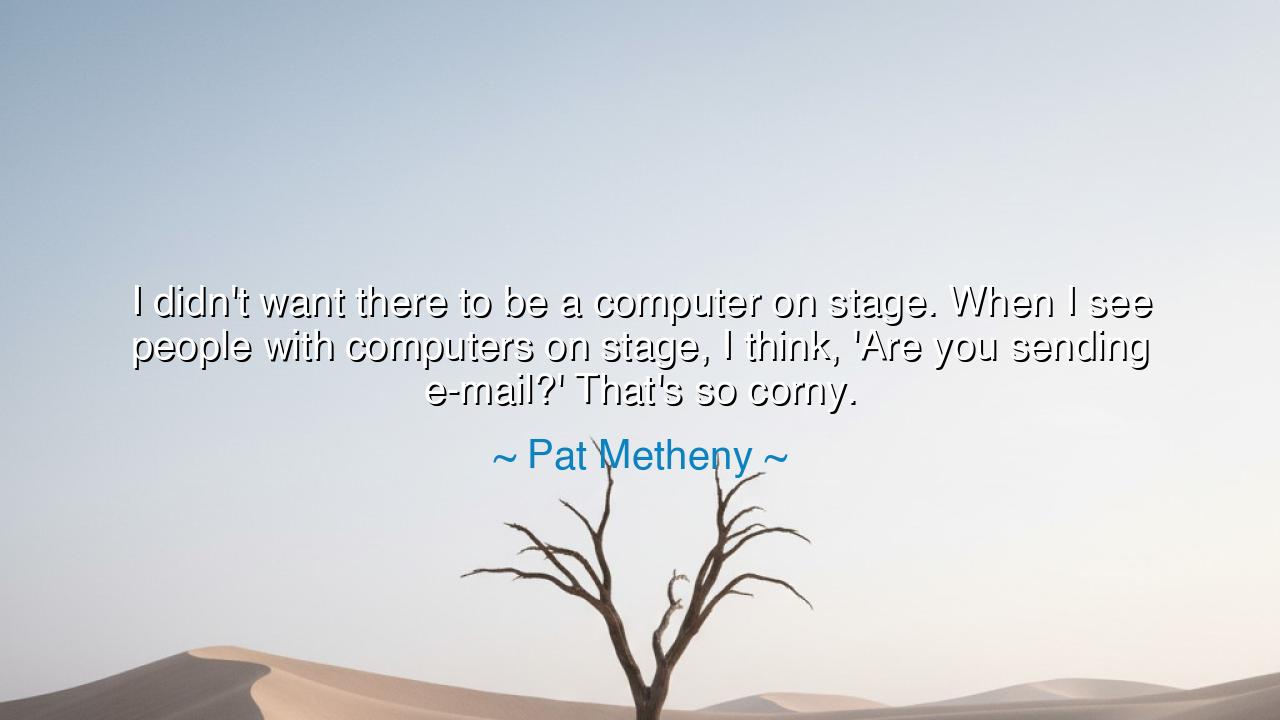
I didn't want there to be a computer on stage. When I see people
I didn't want there to be a computer on stage. When I see people with computers on stage, I think, 'Are you sending e-mail?' That's so corny.






Listen, O children of the earth, to the words of Pat Metheny, a master of music, who spoke thus: "I didn’t want there to be a computer on stage. When I see people with computers on stage, I think, 'Are you sending e-mail?' That’s so corny." In this single statement, Metheny, a man who has spent his life creating with the purest form of expression—music—calls us to look beyond the shallow illusions of the modern age, to seek the true essence of art and creativity, and to question the tools that we rely on in our pursuit of greatness. This is not just a critique of technology, but a challenge to understand the sacredness of the moment, the authenticity of human expression, and the raw, unfiltered truth that is often lost in the glow of the screen.
In the days of old, artists stood on their stages—whether it be a poet, a painter, or a musician—and gave of themselves in ways that were pure, unadulterated, and full of emotion. Their craft was not one mediated by machines or distant distractions, but one that flowed directly from the heart to the audience, unbroken and unfiltered. Metheny’s words, though spoken in the context of his music, speak to a much larger truth about our modern world, where technology has come to occupy so much of our lives. There was a time when a person’s presence was their greatest tool, when the soul of an artist could be felt in the sweat of their brow and the passion in their voice. Now, Metheny asks us, what happens when the screen between the artist and their audience becomes the bridge? Do we lose something in that space?
Consider the great artists of the past, those who shaped entire eras with their craft. Take Beethoven, whose music came not from a digital interface or a carefully constructed machine, but from the depths of his soul, channeled through his hands onto paper, into the world. He had no electronic devices to guide him; his only instruments were the piano keys, the violin strings, the human voice. His creativity was born in a moment of intense human connection between his mind, his emotions, and his art. His audience could feel every note, every pause, every crescendo of his soul. In comparison, today, we stand at the crossroads of art and technology, often unsure if the tools we now use to create are enhancing or diluting the essence of what we do.
Pat Metheny's refusal to have a computer on stage is a call to purity—a refusal to let the distracting hum of technology pull away from the deep connection that music has with the human spirit. He is saying: Let the art be real, let it be raw, let it be human. When we stand before an audience, we should not be distracted by the constant temptation of the digital world, the ping of e-mail, or the endless scroll of social media. Art, true art, demands our full presence—it requires us to give ourselves to the moment completely, not to be fragmented by external distractions. The computer, in this sense, is not merely an instrument; it is a barrier, a wall between the artist’s soul and the world.
Think of the great orators of history, those who stood before vast crowds and delivered speeches that shook the very foundations of society. Abraham Lincoln, when delivering the Gettysburg Address, had no teleprompter or computer screen to guide him. His words came directly from his heart, from his understanding of the human condition and his hope for a nation. In that moment, his connection with the people was direct and unimpeded. The soul of the orator shone through, lighting the path for all who listened. In today’s world, though, how often do we see speeches delivered behind a sea of glowing screens, where the connection between speaker and audience is clouded by technology?
So, what lesson can we take from Metheny’s words? It is a call to return to authenticity, to the core of what it means to create. Whether you are a musician, an artist, a writer, or a speaker, let your work come from the deepest parts of your being, unfettered by the distractions of the modern world. Turn off the noise, the digital hum, and engage with your art in its purest form. Let your presence be your greatest tool, and let your audience feel that presence with every word, every note, every stroke of your brush. Technology is not the enemy—it is simply a tool. But when we allow it to obscure our connection to the world and to our art, we risk losing the very soul of our work.
In your own life, seek the moments of clarity, of focus, where you can immerse yourself fully in your craft. Turn off the distractions—be it a phone, a computer, or any other device—and allow your mind, heart, and soul to speak freely through your work. Take the stage—whether in life or in art—with nothing but your true self to offer. In this, you will find not only the essence of your creativity but also a deeper connection to the world around you. The true art of living, as Metheny’s words remind us, lies not in the tools we use, but in the purity of our expression.






AAdministratorAdministrator
Welcome, honored guests. Please leave a comment, we will respond soon